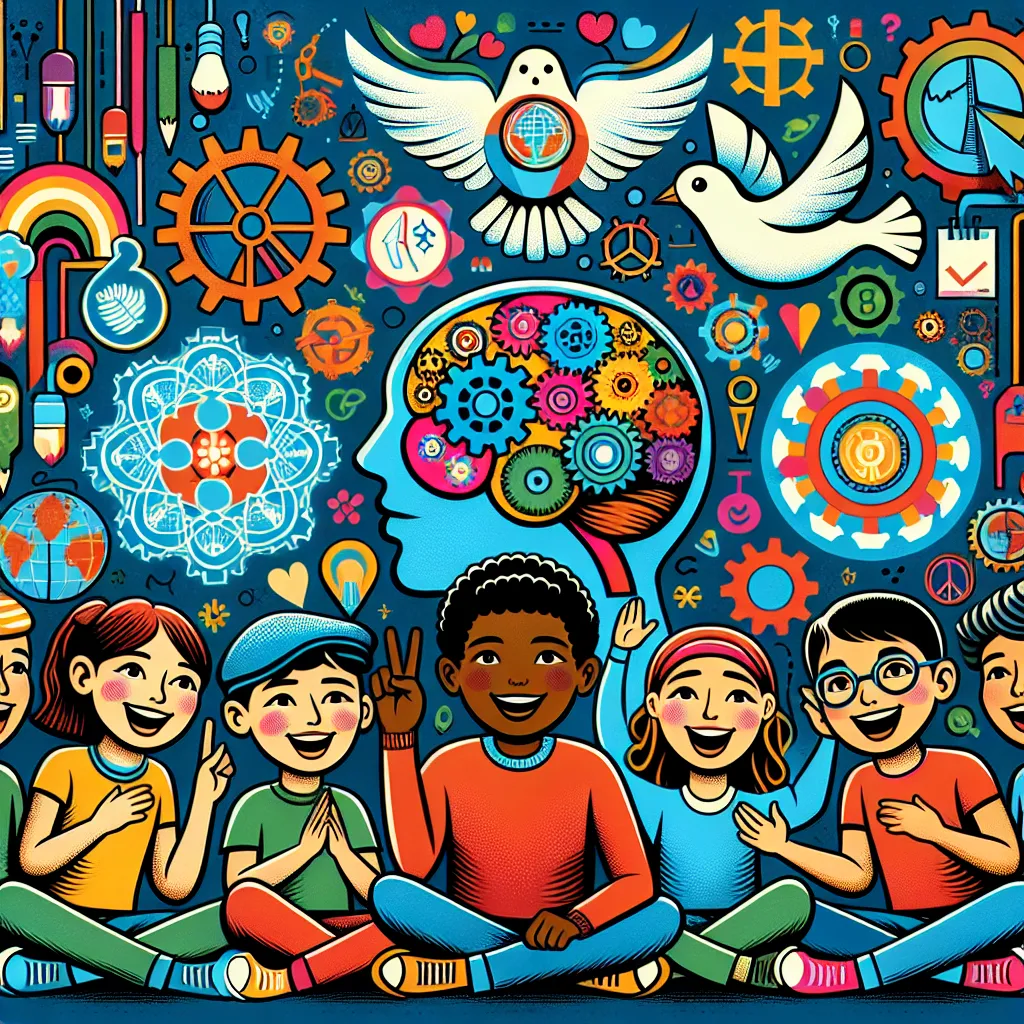In recent years, the topic of bilingual education has become increasingly prevalent in IELTS Writing Task 2 essays. This trend reflects the growing importance of multilingualism in our interconnected world. As an IELTS instructor, I’ve observed a significant uptick in questions related to language learning and its impact on global society. Let’s explore this topic in depth, providing you with valuable insights and practical examples to enhance your IELTS writing skills.
Analyzing the Topic
The benefits of bilingual education in a globalized world is a multifaceted subject that touches on various aspects of modern life, including education, career opportunities, cultural understanding, and cognitive development. IELTS examiners often frame questions around this topic to assess candidates’ ability to discuss complex societal issues.
Based on recent exam trends and the relevance of this subject, I’ve selected a question that closely resembles those seen in actual IELTS tests:
Some people believe that in our increasingly globalized world, it is essential for children to receive bilingual education from an early age. To what extent do you agree or disagree with this view?
Question Analysis
This question requires you to:
- Understand the concept of bilingual education
- Consider the implications of globalization on education and language skills
- Evaluate the importance of early language learning
- Express your opinion on the necessity of bilingual education for children
- Provide reasons and examples to support your position
Remember, there’s no “correct” answer. The examiners are interested in how well you can articulate and support your viewpoint.
Sample Essays
Band 8-9 Essay
In our increasingly interconnected world, the ability to communicate in multiple languages has become a valuable asset. I strongly agree that providing children with bilingual education from an early age is crucial in preparing them for the challenges and opportunities of a globalized society.
Firstly, early bilingual education offers significant cognitive benefits. Research has consistently shown that children who learn two languages simultaneously develop enhanced cognitive flexibility, problem-solving skills, and creativity. These mental advantages extend beyond language proficiency, positively impacting overall academic performance and critical thinking abilities. By exposing children to bilingual education early, we are essentially providing them with a cognitive toolkit that will serve them well throughout their lives.
Moreover, bilingualism opens doors to diverse cultural experiences and understanding. In a world where cross-cultural communication is increasingly common, the ability to understand and navigate different cultural contexts is invaluable. Bilingual individuals are better equipped to appreciate cultural nuances, fostering greater empathy and global awareness. This cultural competence is not just personally enriching but also professionally advantageous in an increasingly globalized job market.
Furthermore, early bilingual education prepares children for future career opportunities. As businesses expand globally, the demand for multilingual professionals continues to rise. By equipping children with bilingual skills from a young age, we are enhancing their future employability and career prospects. This linguistic advantage can lead to better job opportunities, higher salaries, and increased professional mobility in an increasingly competitive global economy.
However, it is important to acknowledge that implementing effective bilingual education programs can be challenging. It requires well-trained teachers, appropriate resources, and a supportive educational environment. Without proper implementation, there is a risk of confusion or inadequate proficiency in both languages. Therefore, while I strongly support bilingual education, I believe it must be implemented thoughtfully and with adequate support to ensure its effectiveness.
In conclusion, the benefits of early bilingual education in our globalized world are substantial and far-reaching. From cognitive advantages to cultural understanding and enhanced career prospects, bilingualism equips children with essential skills for success in the 21st century. While challenges exist in implementation, the potential rewards make it a worthy investment in our children’s future.
(Word count: 345)
 Bilingual Education Benefits
Bilingual Education Benefits
Band 6-7 Essay
In today’s world, many people think it’s very important for children to learn two languages from a young age. I agree with this idea because it can help children in many ways in our globalized world.
One main reason why bilingual education is good is that it helps children’s brains develop better. When kids learn two languages, they learn to think in different ways. This can make them better at solving problems and being creative. These skills are very useful not just for languages but for all subjects in school and later in life.
Another benefit is that bilingual education helps children understand different cultures. When you know two languages, you can talk to more people and learn about their way of life. This is really important in our world where people from different countries often work and live together. Understanding other cultures can help people get along better and avoid misunderstandings.
Also, knowing two languages can help children get better jobs when they grow up. Many companies today work with people from different countries. They need workers who can speak more than one language. If children learn two languages when they are young, they will have more job choices and might earn more money in the future.
However, teaching two languages to young children can be difficult. Schools need good teachers who know how to teach two languages well. It can also be confusing for some children at first. But I think these problems can be solved with good planning and support.
In conclusion, I believe that bilingual education is very important for children in our global world. It helps them think better, understand different cultures, and have more job opportunities in the future. While there are some challenges, the benefits of bilingual education are worth the effort.
(Word count: 296)
Writing Tips
When addressing this topic, consider the following:
-
Structure: Ensure a clear introduction, body paragraphs, and conclusion. Each body paragraph should focus on a distinct point.
-
Vocabulary: Use a range of vocabulary related to education, globalization, and language learning. For higher band scores, incorporate more sophisticated terms and phrases.
-
Grammar: Demonstrate a variety of grammatical structures. For Band 8-9, use complex sentences and advanced structures correctly. For Band 6-7, focus on using a mix of simple and compound sentences accurately.
-
Coherence and Cohesion: Use linking words and phrases to connect ideas smoothly. Higher band essays should have more sophisticated linking devices.
-
Examples: Provide specific examples to support your points. Higher band essays should have more detailed and relevant examples.
-
Task Response: Ensure you fully address all parts of the question. Higher band essays should present a more nuanced argument with a clear position throughout.
Key Vocabulary
Here are some useful terms for discussing this topic:
-
Bilingualism (noun) /baɪˈlɪŋɡwəlɪzəm/: The ability to speak two languages fluently.
-
Cognitive flexibility (noun phrase) /ˈkɒɡnətɪv ˌflɛksəˈbɪləti/: The ability to adapt thinking or attention in response to different situations.
-
Cultural competence (noun phrase) /ˈkʌltʃərəl ˈkɒmpɪtəns/: The ability to understand, communicate with, and effectively interact with people across cultures.
-
Globalization (noun) /ˌɡləʊbəlaɪˈzeɪʃən/: The process of interaction and integration among people, companies, and governments worldwide.
-
Linguistic advantage (noun phrase) /lɪŋˈɡwɪstɪk ədˈvɑːntɪdʒ/: The benefits gained from knowing multiple languages.
-
Multilingual (adjective) /ˌmʌltiˈlɪŋɡwəl/: Able to speak several languages fluently.
-
Cross-cultural communication (noun phrase) /krɒs ˈkʌltʃərəl kəˌmjuːnɪˈkeɪʃən/: The exchange of information between people from different cultural backgrounds.
-
Employability (noun) /ɪmˌplɔɪəˈbɪləti/: The quality of being suitable for paid work.
-
Cognitive development (noun phrase) /ˈkɒɡnətɪv dɪˈveləpmənt/: The construction of thought processes, including remembering, problem-solving, and decision-making.
-
Cultural awareness (noun phrase) /ˈkʌltʃərəl əˈweənəs/: The understanding of the differences between oneself and people from other countries or backgrounds.
Conclusion
The benefits of bilingual education in a globalized world is a rich topic that allows you to showcase your understanding of contemporary issues in education and society. As you prepare for your IELTS Writing Task 2, consider practicing with similar questions such as:
- “Some argue that learning multiple languages in school reduces the time for other important subjects. Do you agree or disagree?”
- “To what extent does bilingualism contribute to a person’s career success in the modern world?”
- “Discuss the advantages and disadvantages of implementing bilingual education programs in primary schools.”
Remember, the key to success in IELTS Writing Task 2 is practice. Try writing your own essay on this topic and share it in the comments section below. This active practice will help you refine your skills and gain valuable feedback. Good luck with your IELTS preparation!


